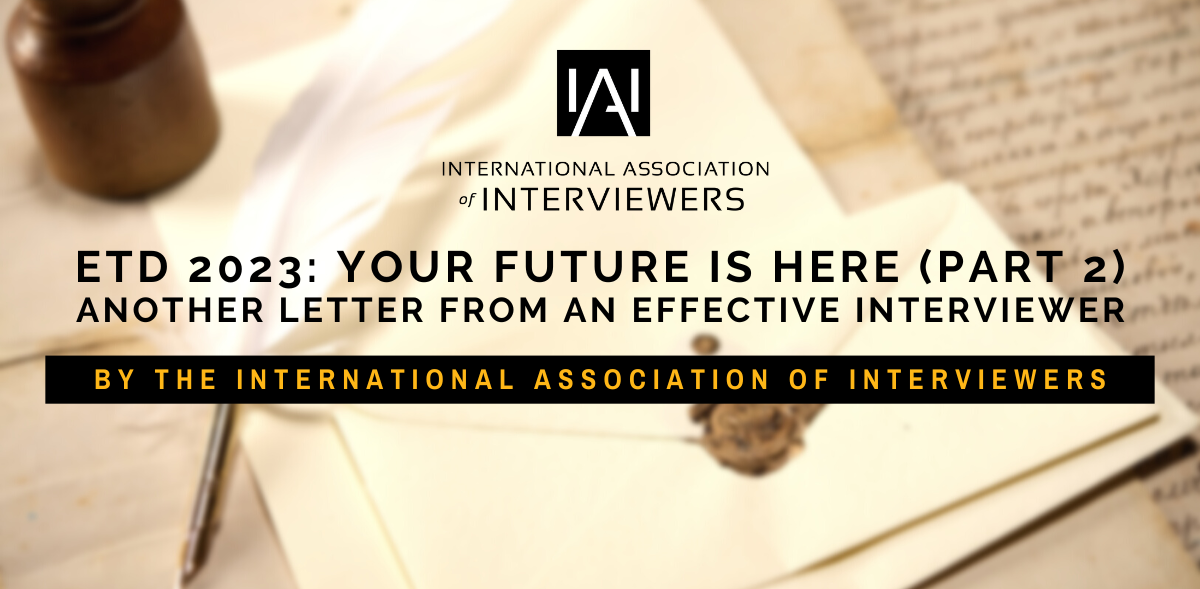One of the most common questions we get at our training seminars on Interview & Interrogation Techniques is: “What’s next?” This is a great question considering attendees just sat through at least a 16 hour program packed with an enormous amount of content. This highly educational information certainly increased the knowledge of those attending, but did little to increase their actual skills. I can read countless Golf Digest magazines, but I can’t golf better until I practice what has been learned. The same is true when it comes to the art of interviewing and interrogation.
It takes a lot of practice to master the skills of a good interrogator, unfortunately that practice is typically done in the form of role play with a mentor that may not have been through our seminar in several years and has likely developed bad habits that they now pass on. In some cases, the new investigator is asked to conduct their first interview or interrogation shortly after our seminar with little or no practice based on the significant amount of evidence they have developed. Although it is likely they received an admission from the subject based on the evidence they had, it is unlikely they did a very good job applying what was learned in our seminar. Mistakes that were made during this initial interrogation are reinforced as being correct because of the success of obtaining the admission, resulting in confirmation bias.
This is a very risky approach to take, considering we are having conversations that affects an individual’s livelihood, reputation and could result in severe consequences. It is critical that investigators have the opportunity to practice accurately what they have learned and build confidence in the method necessary to be a good interrogator in a safe, risk-free environment before they are asked to interrogate in real life cases.
Human behavior is unpredictable. Until it becomes a perfected science it’s impossible for anyone to know everything related to the interview and interrogation process. Being a great interviewer requires continuing education and practice. Below I will share with you what I believe to be the best answer to the question of “What’s next?”
What’s Next? Convert Your Knowledge Into Skills
Now that you have the knowledge, turn that knowledge into skill with “THE LINK”, a computer based interactive interrogation simulation that allows users to practice their interrogation skills and master them the way they were taught. THE LINK has three different degrees of difficulty starting with a passive personality that helps the interviewer navigate through all the steps learned in the WZ two-day Non-Confrontational seminar without a lot of difficulty from the suspect, Bob. It might take several times through the program to achieve a passing score that will allow the user to move to the next level. At each level the subject becomes more sensitive and his personality changes as the difficulty of the simulation increases, requiring the interviewer to compensate and counter each new reaction. During each level, a coach provides immediate feedback which is added to a reviewable transcript that maps the interviewer’s progress while highlighting areas for improvement. With The Link, all users get the same practice that mirrors what was taught in the seminar allowing the interviewer to master the technique, while building confidence to be a top level interrogator. For more information and a video demo of THE LINK, click here.
What’s Next? Join a Community of Interviewing Professionals
I also recommend investigators join the International Association of Interviewers (IAI). The IAI mission is to provide educational, business and networking opportunities to interviewers from all disciplines through valuable resources such as instructive events like this year’s Elite Training Day. Click here for details about the event and the internationally renowned speakers and topics they will present. There is a tremendous amount of content available to members which helps to strategize their interrogations, such as the rationalization matrix and video tips as well as exclusive webinars and much more. For all those attending our two-day open registration seminar this year, you should definitely take advantage of your opportunity to join IAI FREE for one year. To learn more about IAI membership and existing educational resources visit www.certifiedinterviewer.com
What’s Next? Advanced Your Skills
The next step one should consider is attending our one-day Advanced Seminar or our two-day Premier Investigator’s Workshop. Both programs will focus on how to deal with the more complex, difficult cases and personality types. What do you do when things you learned in the two-day class are not working? These workshops allow participants to share experiences and work together to identify the causes of resistance, denials and objections so they can be prevented before starting the interview. Participants will learn how to overcome these obstacles when they do happen and will receive immediate feedback from the instructor. In addition, attendees will participate in video case studies where they will be given facts of a real case and build their strategy while navigating through the interrogation, comparing their decisions to others in the class as well as the instructor. These interactive workshops are packed with advanced content to help investigators achieve the next level in the area of interview and interrogation. For more information click here.
What’s Next? Become an Expert
The ultimate goal for any interrogator should be to achieve the designation of a Certified Forensic Interviewer (CFI). A CFI is a professional with the expertise to conduct a variety of investigative interviews successfully, confidently, and efficiently. A CFI has the knowledge to conduct interviews with victims, witnesses, suspects or other sources to determine the facts regarding suspicions, allegations or specific incidents in either public or private sector settings. The CFI represents the highest standards and ethics when it comes to interview and interrogation and enhances the credibility of investigators in the investigative and legal communities.
Any investigator who enjoys the challenge of successfully closing an investigation by obtaining the truth from the suspect knows that there is always more to learn and requires continuing education. The CFI requires continued education to maintain the designation and IAI provides many different educational opportunities.
When attendees are asking “What’s Next?” after our training program, it’s a good indication of somebody who recognizes the need for continuing education and a passion to excel in their field. As we discussed, there are a variety of options for new and experienced interviewers alike to keep their skills progressing. Hopefully this blog was able to provide some guidance the next time you ask yourself, “What’s next?”



